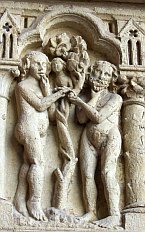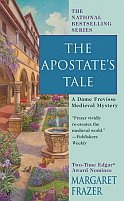MYSTERY
|
|

|
|
|
|
|

Temptation of Adam and Eve, close-up of the southern part of the facade
portal of the cathedral Notre-Dame in Amiens, France
Phot Credit: Guillaume Piolle
|
|
BOOK
ILLUMINATIONS
From Medieval Book Reviews
HOME
ROMANCE
FICTION SUSPENSE & THRILLERS
MYSTERY
AUTHORS REVIEWER
PROFILES
|
The Apostate's Tale:
A Dame Frevisse Medieval Mystery

by Margaret Frazer

The return of a long disappeared nun
Publisher:
Berkley (January 2009)
Spring
of 1452 brings fretful weather but nothing as worrisome as
Sister Cecely, a nun who long disppeared from Saint Frideswide's priory
suddenly returns nine years later with her illegitimate son. Dame
Frevisse serves as the hosteler in care of guests. As the nuns
prepare
for easter, Cecely's presence tries the patience and spiritual practice
of the nuns. Followed to the priory by men from her past,
Cecely's
postion becomes even more tenuous. When suddenly sickness turns
two
men ill, Dame Frevisse sets about investigating the illness and whether
this might actually be a case of attempted murder. Who would want
to
kill these men whose positions are at such odds with one another?
THE APOSTATE'S TALE
is a mystery that will medieval enthusiasts feel
right at home. The historical details center around the theology
and
the daily lives of the nuns in their attitudes, inner thoughts and the
practice of the Daily Office as the center of their day. Although
the
answer to the mystery itself is fairly obvious, the thrill of the
mystery centers upon Margaret Frazer's look into the historical and
spiritual details that lead up to the mystery. Margaret Frazer's
juxtaposition of Dame Frevisse and Sister Cecely offers an insightful
look into the world of women in the Middle Ages through a medieval
perspective. Although modern readers might not hold to the
medieval
view of apostacy, Margaret Frevisse does an excellent job at making
this idea accessible to new readers and medieval junkies alike.
Without resorting to a preachy tone as part of the narrative, the idea
of apostacy and its ramifications unfild as part of the plot and
characterization. Characterization gives this mystery a wonderful
depth, not only in the contrast between these two main characters but
also in the presentation of Cecely's son and Dame Thomasine, the nun
known for her exemplary holiness. Margaret Frazer's intriguing
look
into the idea of good, evil and innocence not only adds to the medieval
historical setting but also gives this mystery a satisfying refreshing
depth in a genre in which a dead body is little more than a plot device
for the mystery itself and the aggrandizement or self-actualization of
the sleuth. Margaret Frazer's THE
APOSTATE'S TALE is a refreshing
change of pace for mystery buffs and a welcome familiarity for
medievalist enthusiasts in its multi-leveled historical authenticity.
If you happen to be both like I am, this book a pure delight.
Reviewed by Merrimon,
Medevial Book Reviews

|
|
|